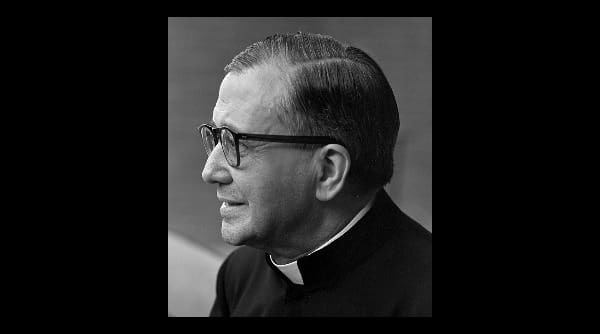The young Spanish priest had felt in his prayer an unidentified urging for several years, a vague call, a sense of something more. On October 2, 1928, while pondering some notes in his journal, Fr. Josemaría Escrivá suddenly saw it: the ‘call within a call’ such as Mother Teresa had received. He saw his mission clearly and definitely – to open a new path to holiness, a way of living out the universal Christian vocation in the midst of the world by sanctifying the everyday and the ordinary.
He would dedicate the rest of his life, until his death on June 26, 1975, to this great “Work of God,” or “Opus Dei” as the movement came to be called.
Fueled by an intense inner life of prayer, he and the tens of thousands of lay men, women and priests who would follow him would find that by perfecting, uniting to the cross, and offering up of their professions, their friendly interactions, their recreation, their family life – all human activity – there was a natural but powerful way to sanctify both the world and themselves.
This ‘Way’ is a foundational charism of Opus Dei, now a familiar and formally recognized movement in the Church. Fr. Josemaría Escrivá would himself be raised to sainthood by Pope St. John Paul II in 2002. But just as St. Josemaría gave himself completely to the whole Church, his message and his means of holiness are meant for us all.
In fact, the mission he received so willingly would prophetically precede one of the central themes of Vatican II – the ordinary baptismal call to holiness of all believers. Each of us has a mission, often unseen (and all the holier for it!) to sanctify all of our everyday realities. And beautifully, paradoxically, it is we who in turn find ourselves sanctified through our small movements of cooperation with God.
The word of encouragement to a friend, the daily Mass with toddlers in tow, the well-written professional proposal, the deliberate work of a craftsman, the cake baked with care. It’s divine. All of it.
And when we mingle our work with our worship, like water and wine, we find that the division between heaven and earth blurs and God infuses our hearts with Himself. St. Josemaría would foreshadow not only Vatican II, but he would point us to the reality of heaven itself in the here and now.
In the spiritual writings he left behind, this saint of everyday holiness gave us thousands of gems for meditation. Here are a few to take to prayer as we celebrate his feast day:
Do you really want to be a saint? Carry out the little duty of each moment: do what you ought and put yourself into what you are doing. (The Way, 815.)
You want to be a martyr. I’ll place a martyrdom within your reach: to be an apostle and not call yourself an apostle, to be a missionary – with a mission – and not call yourself a missionary, to be a man of God and to seem a man of the world: to pass unnoticed! (The Way, 847.)
We are children of God. Bearers of the only flame that can light up the paths of the earth for souls, of the only brightness which can never be darkened, dimmed, or overshadowed. The Lord uses us as torches, to make that light shine out…It depends on us that many should not remain in darkness, but walk instead along paths that lead to eternal life. (The Forge, 1.)
Live and work for God, with a spirit of love and service, with a priestly soul, even though you may not be a priest. Then all your actions will take on a genuine supernatural meaning which will keep your whole life united to the source of all graces. (The Forge, 369.)
St. Josemaría, pray for us!
Image credit: Oficina de Información de la Prelatura del Opus Dei en España [CC BY-SA 2.0], via Wikimedia Commons




